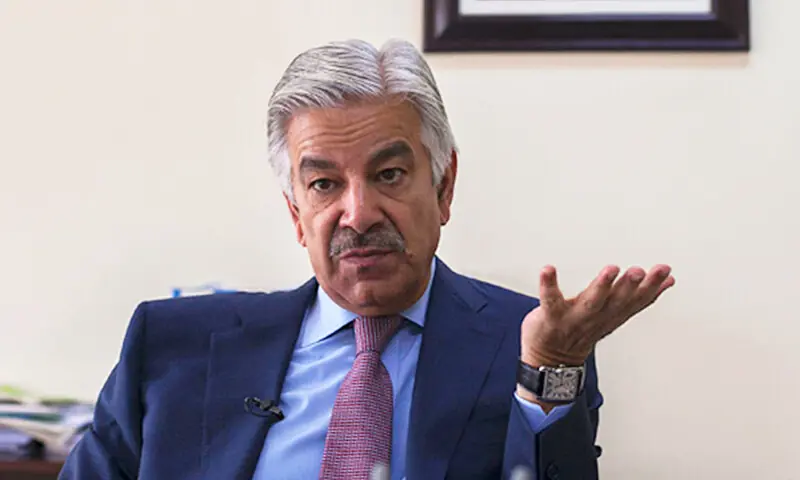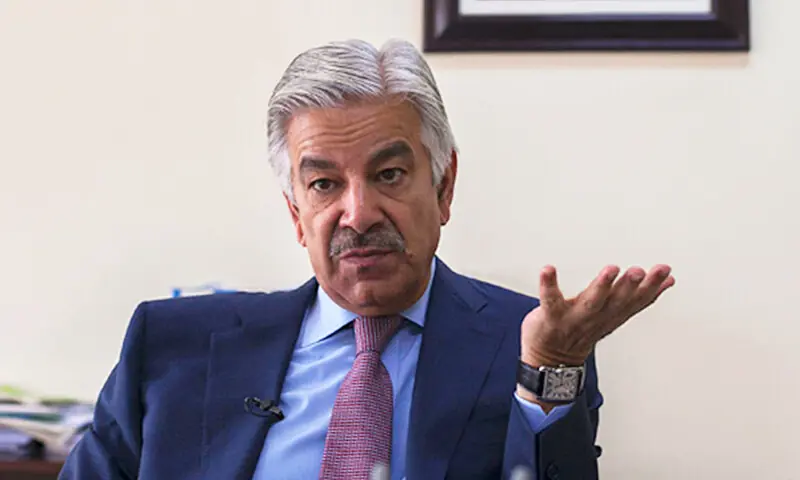Defence Minister Khawaja Asif said on Thursday that entry of other Arab countries into a common defense agreement between Pakistan and Saudi Arabia was not excluded, saying the “doors for such developments were not closed.”
Pakistan and Saudi Arabia enter landmark mutual defense protocolin which any aggression against a country will be considered an attack on both. “Strategic Mutual Defense” was signed by Prime Minister Shehbaz Sharif and Saudi Crown Prince Mohammad bin Salman Riyadh Wednesday.
More information about talking about the deal in an interview Geographic News Showing “AAJ Shahzeb Khanzada Kay Sath” and whether there are more Arab countries that can be part of it, Asif said: “I can’t answer this question too early, but I will definitely say the door is not closed.”
Asif said that due to the greater vulnerability of Pakistan, he has been calling for a similar arrangement, which shows the history of the region in the past 40-50 years.
“I think it is the fundamental right of the country and the people here, especially the Muslim population, to jointly defend its region, country and country.”
He said there is no clause in the agreement that excludes entry from any other country or that Pakistan cannot sign a similar agreement with anyone else.
Asked if Pakistan’s nuclear assets could also be used under the agreement, Asif said: “What we have, our capabilities, will definitely be available under this agreement. However, I said that since Pakistan has become a nuclear state, no one has ever challenged us to become our status as a nuclear state. Responsible nuclear power. transparent
Asif said Pakistan has been providing its nuclear facilities for inspection and has never committed any violations. He added that this is contrary to Israel, which does not allow any inspections.
Regarding whether any attack by one country will lead to the participation of another country and vice versa, the minister said: “Yes, absolutely. There is no doubt.”
He said neither Pakistan nor Saudi Arabia designated or regulated the implementation of defense agreements with any particular country. “This is an umbrella provided by both parties and if it is aggressive from either side to either side, it will jointly defend and respond.”
Asif clarified that this is not a “positive convention” but a defensive arrangement, similar to NATO.
He added that Pakistan also participated in the legs train Saudi forces have been around for a while, and the most recent development is just a formal “expansion” of all of this, adding that it is a positive thing.
“If it is aggressive, whether it is against Saudi Arabia or Pakistan, we will defend it together.”
He said Pakistan has been negotiating with Saudi Arabia on the issue, saying the former has been ongoing in large military and air force alliances in the last few decades.
“I think the relationship (of (sex) relationship (now) has become more clear and has been given the form of a defense agreement. This is embedded in our military cooperation and brotherly relationship with Saudi Arabia.”
Asif also said that protecting the Saint Islamic ruins in Saudi Arabia is also a matter of Pakistan’s “sacred duty”.
Asif questioned whether the United States was confident in the matter and he believed he had no reason or reason for other third parties to participate in the development.
“The agreement is not a hegemonic arrangement, but a defensive arrangement…we have no plans to conquer territory or attack anyone. But our fundamental rights can reject us, we acted yesterday.”
He reiterated that Pakistan could make similar arrangements with other countries.
“Afghanistan is a hostile country”
Asif Asifu on terrorist attacks on security forces Reiterate That Afghan soil It is used to conduct terrorist acts in Pakistan.
“We were swept through two wars in Afghanistan. The United States left the region twice and we are still dealing with the consequences, whether it’s the Taliban, the TTP (Tehreek-ee-Taliban Bakistan), the BLA (Balochistan oferation Armect) or anyone else,” Asif secondary of the Internationals and Internationals of Asif and Internationals of us.
He added: “People embrace hard every day; because of these two wars, this responsibility has emerged.” “The Kabul government is not innocent about it, I am absolutely. Through these people, we are blackmailed by them.
“I have no ambiguity: Afghanistan is a hostile country.”
The defense minister added that Afghanistan was the last country to recognize Pakistan and there was nowhere to go for discussions about terrorism.
Asif encouraged this when asked whether the Arab states would have aggression against Afghanistan.
“I won’t object, but how many times have we been there? They’ve also been involved in our politics, I won’t name the party,” he said. “This party advocates for those who have mastered the blood of our children.
“This is a topic that Pakistan should be clear about, and we know very well.”
National Defense Agreement
At the end of Prime Minister Shebaz’s one-day state visit, the agreement “reflects the shared commitment of the two countries to enhance their security and to achieve security and achieve security and speed in the world”, according to the text of a joint statement issued simultaneously by Islamabad and Riyadh.
“(IT) aims to develop all aspects of defense cooperation below the two countries and strongly oppose any aggression,” the SARS statement without elaboration.
Importantly, the text emphasizes that “any aggression against any country should be regarded as an aggression against both”.
The timing of the agreement follows Arab Summit This shows the shift to collective safe travel following the Israeli attack on Qatar – suggesting it stems from current world affairs and reflects the defense concerns of both countries.
The agreement marks the most important escalation in Pakistan-Sudi defense ties over decades. The cooperation between the two countries can be traced back to 1967 and deepened after 1979 Epilepsy seizures in the Grand MosqueWhen Pakistani special forces helped Saudi forces recover the mosque Al-Haram.
In 1982, both sides Institutionalization Security and Bilateral Security Cooperation Agreement, which is capable of Pakistan training, consulting support and deployment on Saudi soil. Sometimes as many as 20,000 Pakistani troops are stationed in the Kingdom, and Saudi Arabia becomes the main buyer of Pakistan-made weapons.
In recent years, such partnerships have caused a urgency due to regional instability. In February, a meeting of the Joint Military Cooperation Commission of Riyadh promised to expand training and exchanges.
The new contract formally demonstrates a long-standing commitment in practice, thus creating some analysts who are actually joint defense umbrellas, although details of the agreement are not disclosed.
For Pakistan, the agreement provides strategic and economic benefits. It received significant Saudi investment and funding in a time of financial pressure, while strengthening Islamabad’s position as a provider of pan-Islamic security.
For Saudi Arabia, it strengthened its defense against Iran, the threat from Houthi militias and regional unrest caused by Israel’s genocide operations in Gaza and the aggression of other nearby countries. The Israeli attacks against the Doha Hamas delegation exacerbated the urgency of the agreement that had been discussed for some time.
Pakistan’s earlier defense alignments, such as the Cold War-era agreements with the United States and Sito and the Center, have long eroded. Islamabad and China,,,,, Türkiye and other Gulf countries are still important, but lack binding mutual defense clauses.
Against this backdrop, Wednesday’s signing represents Pakistan’s most tense formal defensive commitment in decades, with its security role not hesitating to connect it with the ever-evolving strategic building.



